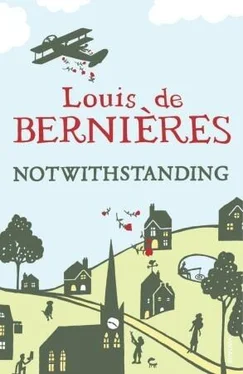Louis de Bernieres - Notwithstanding - Stories from an English Village
Здесь есть возможность читать онлайн «Louis de Bernieres - Notwithstanding - Stories from an English Village» весь текст электронной книги совершенно бесплатно (целиком полную версию без сокращений). В некоторых случаях можно слушать аудио, скачать через торрент в формате fb2 и присутствует краткое содержание. Год выпуска: 2010, Издательство: Vintage, Жанр: Современная проза, на английском языке. Описание произведения, (предисловие) а так же отзывы посетителей доступны на портале библиотеки ЛибКат.
- Название:Notwithstanding: Stories from an English Village
- Автор:
- Издательство:Vintage
- Жанр:
- Год:2010
- ISBN:нет данных
- Рейтинг книги:4 / 5. Голосов: 1
-
Избранное:Добавить в избранное
- Отзывы:
-
Ваша оценка:
- 80
- 1
- 2
- 3
- 4
- 5
Notwithstanding: Stories from an English Village: краткое содержание, описание и аннотация
Предлагаем к чтению аннотацию, описание, краткое содержание или предисловие (зависит от того, что написал сам автор книги «Notwithstanding: Stories from an English Village»). Если вы не нашли необходимую информацию о книге — напишите в комментариях, мы постараемся отыскать её.
is a funny and moving depiction of a charming vanished England.
Notwithstanding: Stories from an English Village — читать онлайн бесплатно полную книгу (весь текст) целиком
Ниже представлен текст книги, разбитый по страницам. Система сохранения места последней прочитанной страницы, позволяет с удобством читать онлайн бесплатно книгу «Notwithstanding: Stories from an English Village», без необходимости каждый раз заново искать на чём Вы остановились. Поставьте закладку, и сможете в любой момент перейти на страницу, на которой закончили чтение.
Интервал:
Закладка:
‘Yes, I can, sir, but in the end everything depends on the maintenance.’
Chittock stroked his chin with his hand and said, ‘Perhaps you’d like to do the maintenance?’
‘I’m sure we can come to an accommodation,’ said the greenkeeper. ‘I expect young Robert would mow it for you. It’s the mowing and rolling that matters mostly, and putting down poison for the worms, and I can come and sort out the spiking and feeding and everything else.’
Royston Chittock volunteered to help Uncle Dick with the labouring, having entertained romantic ideas about the dignity of labour and the benefits of fresh air and fitness, but after one hour he had aching muscles and blisters on his hands. He told Uncle Dick that he had urgent paperwork to attend to, and left him smiling knowingly to himself as he removed and stacked the turves.
Dick set about cutting cubes of clay out of the ground. It was just the right time of year for it, because the ground was neither baked hard, as it is in summer, nor sodden and glutinous as it is in winter. Even so, it was very hard work, complicated by the roots of a may tree nearby, and Dick almost regretted not having ordered in a small earth mover. His reason for not having done so was that he was being paid by the hour, and couldn’t see the point of hurrying anyway. He was happy to dig out the hole over several visits, as long as it didn’t rain too much and turn into a quagmire. He reflected more than once that it would have made an ideal garden pond if it were puddled. The clay was just right, smooth and almost yellow, unalloyed by dirt and stones. It occurred to him that he might be able to sell any surplus to the brick factory.
As the days went by the hole grew larger and the heap of spoil turned into a small hill. Then one day a lorry came from Godalming, reversed across the lawn, leaving tracks four inches deep and emptied several yards of shingle into the hole. Uncle Dick built a kind of wall of clay around it, and laid irrigation pipes out from the centre in a fan. Then another lorry came from Godalming with a load of medium shingle, followed by another a few days later with a load of coarse soil, followed by another loaded with medium soil.
Uncle Dick spent some frustrating hours with his client, who hummed and havered over precisely what contours he wanted. Several times he arrived at something that was simultaneously beautiful, practical and challenging, only to have Mr Chittock come out and say, ‘I was just looking at it from the landing window, and I thought, “What if we just …”’ and then he would explain that he wanted something quite different to what had been previously specified. In the end, taking account of Mr Chittock’s endlessly retelling the story of his ace on the second hole at the West Surrey, Uncle Dick proposed that they reproduce the contours of that particular green, in commemoration of the historic feat. The ploy worked, although the new green would have to be very considerably smaller, and the bunkers proportionally less horrifying.
A lorry containing several yards of sieved topsoil arrived from Hurtmore, and reversed across the ever deepening tracks in the lawn. Uncle Dick raked it for hours to get it into shape, and six inches deep. When this was done to his satisfaction, he knocked on the door of the house and informed Mr Royston Chittock that, although he would be back from time to time, in order to get rid of any weeds, and to roll it, there would be a six-month wait before the next step.
‘Six months!’ exclaimed Chittock. ‘Six months! Really, this is preposterous! Six months!’
‘You let it settle before you seed it,’ said Uncle Dick imperturbably. ‘That’s the best way to do it. If you want it done badly, I’m sure there’s those that might oblige.’
A certain hostility had arisen between the two men over the previous weeks. It was not just because of Mr Chittock’s frequent changes of mind. It was because the latter’s urban suspiciousness led him to cavil constantly about payment, both for labour and materials. He all but accused Uncle Dick of slacking when he wasn’t looking, and of over-ordering shingle so that he could sell some of it on. Uncle Dick had become more and more irritated and curt with his client, and that had only made things worse. By now he had also heard the moleman’s story about the short-changing of Sergeant Corker, and, after initial disbelief, had come to share his disdain for the displaced townsman.
Uncle Dick turned up once a week to see how the ground was settling, sometimes with young Robert’s pet rook, Lizzie, in attendance. Ever since the bird had learned to fly, she had taken to dropping out of the sky on to the shoulders of those she knew, so that she would meet Robert when he alighted from the bus upon returning from school, or, with a jubilant squawk, crash-land in his mother’s shopping basket when she was walking home from the Cricket Green Stores, in the hope that it might contain cheese or grapes. If Lizzie spotted Uncle Dick, whether at the golf course or elsewhere, she would land on his shoulder, murmur sweet nothings in his ear, and set about tidying up the tufts of hair that protruded about his ears from beneath his cap. When he was working on Mr Chittock’s new green, she sat in the hawthorn tree, raising and lowering the feathers on the top of her head as she watched out for worms or leatherjackets. Uncle Dick would stop and stroke her under the chin, repeating ‘silly bugger, silly bugger’. Mimicking young Robert’s voice, she would reply, ‘Come on, come on.’
The six months passed, and Uncle Dick raked the green, sowed it with fescue bent and rolled it. He was confident that the birds would leave it alone, because the seeds had been treated with something to make them taste horrible, and he was confident that there wouldn’t be any worm casts either, because he had dosed the ground with the same poison that they used at the West Surrey.
Mr Royston Chittock came out of the house and said, ‘How long before I can use it, then, my good man?’
Uncle Dick was irritated by the patronising cheeriness that Chittock sometimes liked to affect, but he replied truthfully, ‘Six months, sir. And in the meantime you’ve got to get yourself a little mower with a very fine adjustment, and get those blades sharpened absolutely perfect. Your Suffolk Punch is a damn fine machine, but it’s too big and clumsy for a green. If you’re interested, sir, I expect young Robert would come and mow for you.’
‘Six months?’ repeated Chittock. ‘Another six months? Really, I had no idea it would all take so long.’
‘Well, I’m sorry to say that it does, sir, and there’s no point in hurrying. I did tell you it would take a year. You wouldn’t take a bird out of the oven afore it’s done, and you shouldn’t use a green ’til it’s good and ready.’
In the six months that passed, Royston Chittock worked hard at his golf and managed to win the Stableford competition and the Major Whitworth Men’s Memorial Medal. There were some murmurings in the clubhouse, and he received a joint letter from the men’s captain and the secretary requesting that he submit new cards, since he had consistently been playing far better than his handicap suggested. The letter congratulated him politely upon the extraordinary progress that he had obviously made with his game.
At last the time expired and Mr Royston Chittock had a beautiful green ready to use, a perfect miniature of the second at the West Surrey. Uncle Dick, supervised by Lizzie from her perch in the hawthorn tree, had given it the final mow, cut the first hole and installed a new white cup. Mr Chittock was thrilled.
His delight did not extend to rewarding Uncle Dick with a large tip, however. Instead he disputed the final account, and paid for four hours’ less work than the greenkeeper had actually done, saying, ‘Come, come, my good man, I’m not a fool. I’ve kept a record of when you’ve been here and for how long, and one can’t help noticing that your propensity for stopping and drinking tea has recently become greatly exaggerated.’
Читать дальшеИнтервал:
Закладка:
Похожие книги на «Notwithstanding: Stories from an English Village»
Представляем Вашему вниманию похожие книги на «Notwithstanding: Stories from an English Village» списком для выбора. Мы отобрали схожую по названию и смыслу литературу в надежде предоставить читателям больше вариантов отыскать новые, интересные, ещё непрочитанные произведения.
Обсуждение, отзывы о книге «Notwithstanding: Stories from an English Village» и просто собственные мнения читателей. Оставьте ваши комментарии, напишите, что Вы думаете о произведении, его смысле или главных героях. Укажите что конкретно понравилось, а что нет, и почему Вы так считаете.












